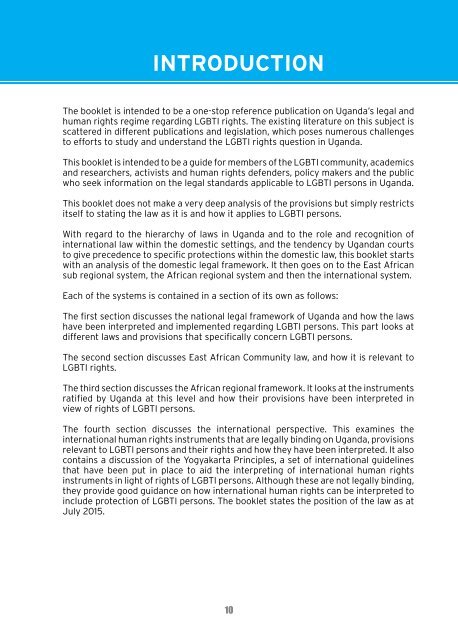PERSONS IN UGANDA
4Tks5WfQb
4Tks5WfQb
Create successful ePaper yourself
Turn your PDF publications into a flip-book with our unique Google optimized e-Paper software.
<strong>IN</strong>TRODUCTION<br />
The booklet is intended to be a one-stop reference publication on Uganda’s legal and<br />
human rights regime regarding LGBTI rights. The existing literature on this subject is<br />
scattered in different publications and legislation, which poses numerous challenges<br />
to efforts to study and understand the LGBTI rights question in Uganda.<br />
This booklet is intended to be a guide for members of the LGBTI community, academics<br />
and researchers, activists and human rights defenders, policy makers and the public<br />
who seek information on the legal standards applicable to LGBTI persons in Uganda.<br />
This booklet does not make a very deep analysis of the provisions but simply restricts<br />
itself to stating the law as it is and how it applies to LGBTI persons.<br />
With regard to the hierarchy of laws in Uganda and to the role and recognition of<br />
international law within the domestic settings, and the tendency by Ugandan courts<br />
to give precedence to specific protections within the domestic law, this booklet starts<br />
with an analysis of the domestic legal framework. It then goes on to the East African<br />
sub regional system, the African regional system and then the international system.<br />
Each of the systems is contained in a section of its own as follows:<br />
The first section discusses the national legal framework of Uganda and how the laws<br />
have been interpreted and implemented regarding LGBTI persons. This part looks at<br />
different laws and provisions that specifically concern LGBTI persons.<br />
The second section discusses East African Community law, and how it is relevant to<br />
LGBTI rights.<br />
The third section discusses the African regional framework. It looks at the instruments<br />
ratified by Uganda at this level and how their provisions have been interpreted in<br />
view of rights of LGBTI persons.<br />
The fourth section discusses the international perspective. This examines the<br />
international human rights instruments that are legally binding on Uganda, provisions<br />
relevant to LGBTI persons and their rights and how they have been interpreted. It also<br />
contains a discussion of the Yogyakarta Principles, a set of international guidelines<br />
that have been put in place to aid the interpreting of international human rights<br />
instruments in light of rights of LGBTI persons. Although these are not legally binding,<br />
they provide good guidance on how international human rights can be interpreted to<br />
include protection of LGBTI persons. The booklet states the position of the law as at<br />
July 2015.<br />
10


